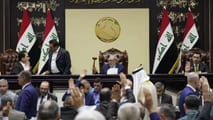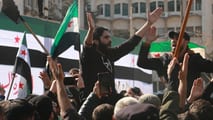ECLJ Assists 43 Christians Threatened With Death & Detained in Their Homes by Muslims in Pakistan

Pakistani Christians who were
detained and threatened.
Basharat Masih was living with his cousin, Irshad Masih, when he befriended Nadia, the Muslim woman. Since Basharat was living with Irshad, Nadia’s mother contacted Irshad and threatened him to keep Basharat away from her daughter or he would be killed. Knowing that it could create problems for his own family, Irshad asked Basharat to leave. On June 21, Nadia’s mother again went to Irshad and told him that Nadia was missing. She also said that Nadia’s father had beaten Nadia the night before for disobeying him. Irshad told Nadia’s mother that he did not know Basharat’s whereabouts since he had left the village about one month ago.
Then, men broke into Irshad’s house in search for Nadia but did not find either her or Basharat. The same afternoon, the council of the village elders ordered that Irshad’s family and all other Christians of the area be detained until they could locate Nadia. The Muslim villagers forced all the Christian families into their homes, barricaded the doors with piles of timber, and sent Irshad and two others to find Nadia, threatening them if they did not find her. With no idea where to search, Irshad and his two companions sought ECLJ’s assistance.
ECLJ attorneys contacted local authorities, who sent the police to the village. The police remained there for an hour and left without freeing the Christians or taking any other action against their illegal detention. Meanwhile, Irshad repeatedly received phone calls from the villagers threatening that the Christians would be burned alive if they did not find Nadia. The Muslims also beat the detainees.
On June 23, The ECLJ filed a habeas corpus petition in the Sessions Court in Renal Khurd. Instead of appointing a court official to recover the detainees, which is the normal course of action in habeas corpus cases in Pakistan, the Court directed the local police to present the Christians before the Court in two days. The ECLJ expressed concern that the Court did not immediately appoint a bailiff to retrieve the captive Christians, a fact that further indicates the general lack of concern for the suffering of Christians. One court official explained that this was the first instance during his lifetime in which the court neither approved nor rejected a habeas corpus petition, but instead ordered the detainees to appear before the court.
On June 25, the police officer appointed to produce the detainees in the Court did not attend the hearing. A few Christians who had managed to escape from their homes appeared in court and recorded their statements about the events. The Judge appointed another police officer to bring the other detainees to court. The police went to the village and released the detained Christians.
To obstruct any opportunity to gather evidence, the police and the Muslims prohibited the media from taking pictures of the prisoners’ release. Incredibly, the officer involved in releasing the Christians stated before the Court that no such confinement had in fact occurred, alleging that the Christians had abducted the Muslim girl and were merely using the Court to delay the investigation of the matter.
Even more troubling, the Muslims filed a complaint against Irshad and Basharat alleging that they had “abducted” Nadia. On July 1, the ECLJ posted bail for Irshad. The Court granted the bail while directing Irshad to join the investigation of the abduction case. We hope the Court will act justly and declare Irshad’s innocence.
In such cases, the conflict is often framed as a religious matter with the police usually siding with the Muslims.
Even if Nadia willfully left with Basharat, marriage between a Muslim woman and a non-Muslim man is prohibited under Shari’ah law. In the past, many such inter-religious couples have been killed by the Muslim girls’ families.
Moreover, such matters are frequently turned into a Christian-Muslim issue, rather than dealt with on an individual level. These types of occurrences, though resulting from an individual’s actions, are imputed to the Christian community as a whole, which usually brings negative consequences for the Christians.
Just last year seven Christians were burned to death and more than 100 Christian homes were burned after an allegation of blasphemy against one Christian.
It's clear that the Pakistani government needs to take stringent action in similar situations to avoid escalation of communal violence and the persecution of minority communities - especially Christians - living in Pakistan.
We will update you on any developments on the case.









